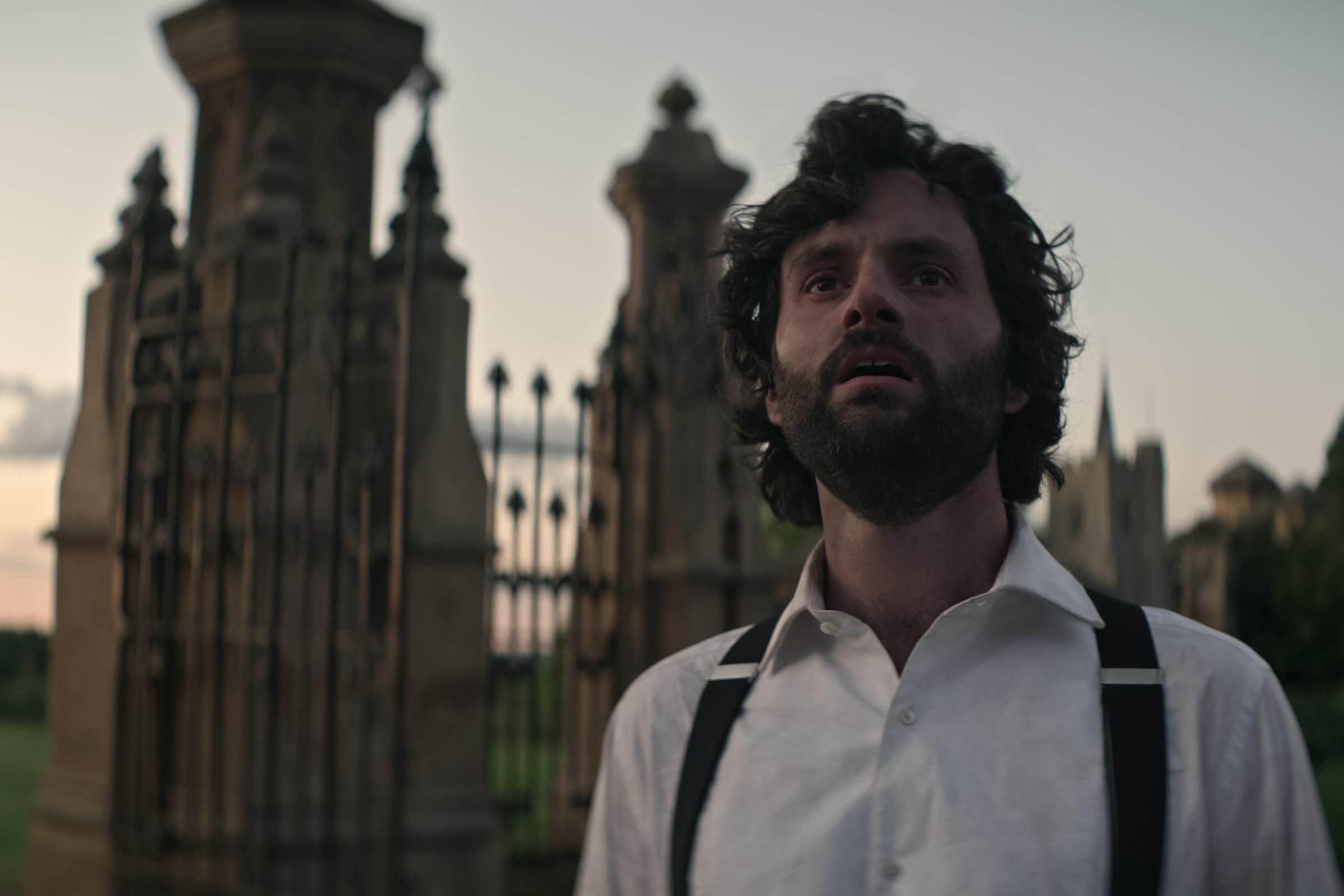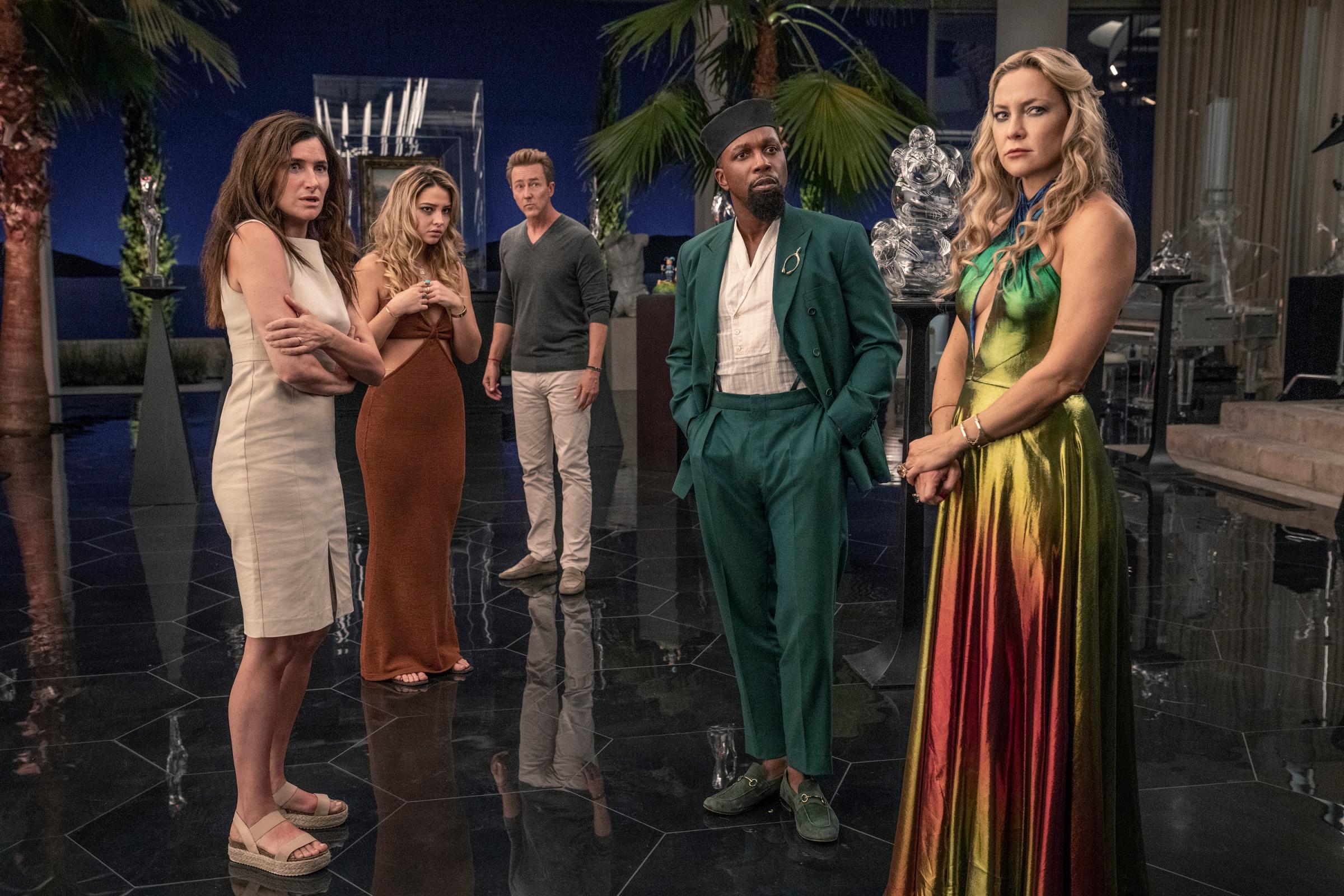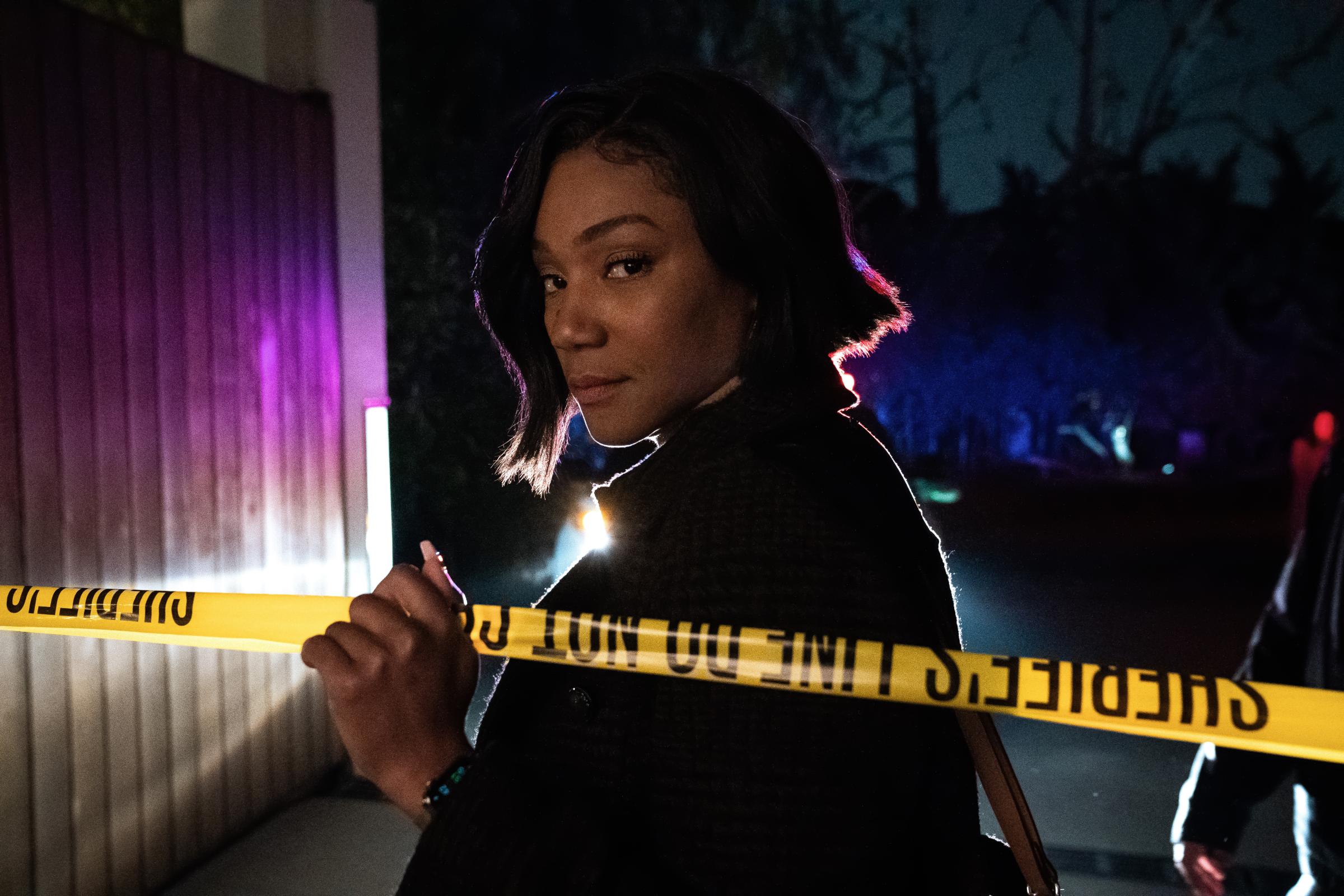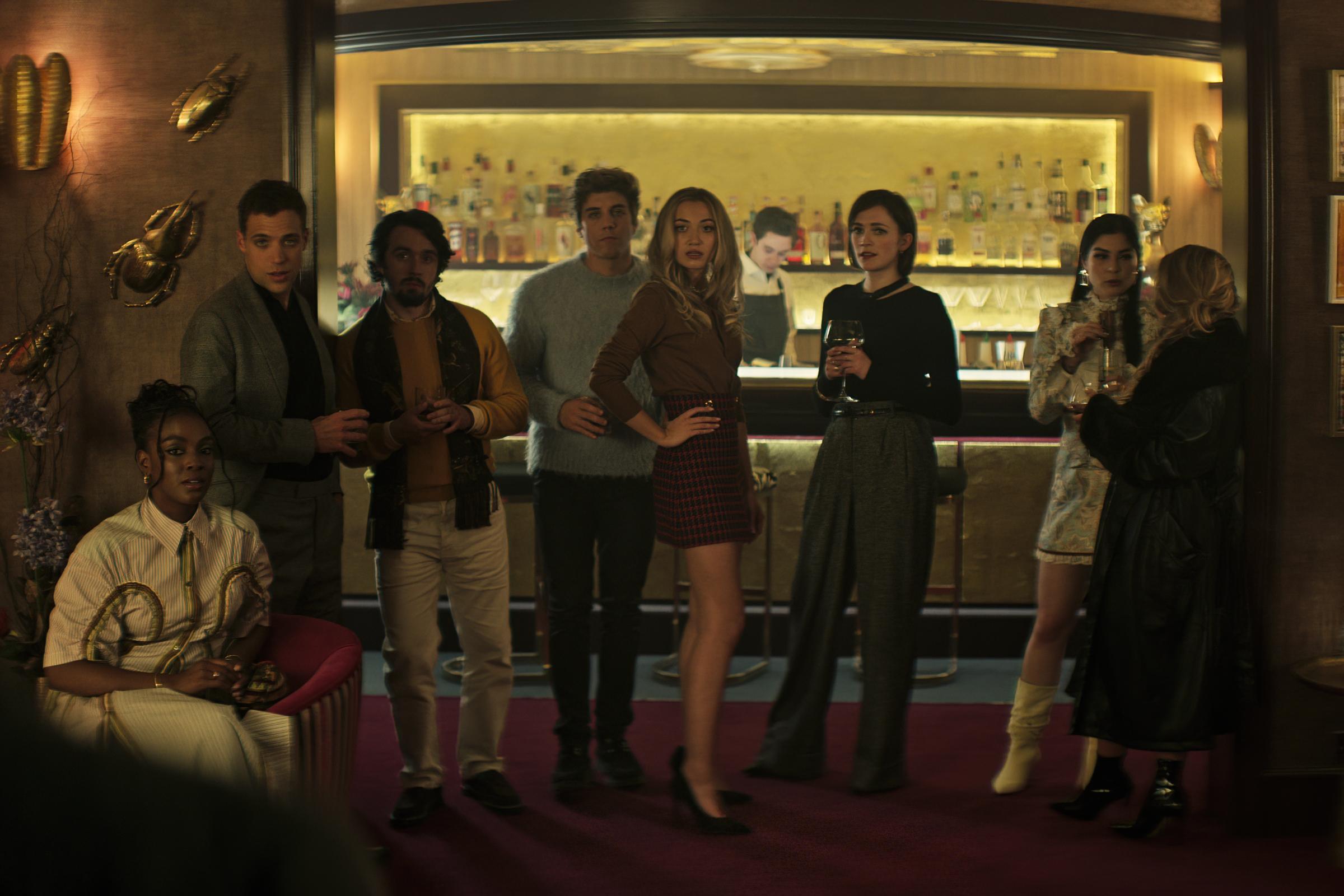
The third season of Netflix’s protean thriller You ended with a red herring. Fresh off murdering his deranged wife, torching their suburban-California home, and faking his own death, accidental serial killer and hopeless romantic Joe Goldberg (Penn Badgley) resurfaced steps away from the Eiffel Tower. Fans joked that Emily “In Paris” Cooper would be his next victim, but the idea that the upcoming season might send up the generic American-girl-in-Paris fantasy didn’t seem far-fetched for a show that had always delighted in satirizing rom-com tropes.
Alas, the scene was a fakeout. The real action of season 4, now streaming, unfolds in London, where the bookish Joe is posing as a university literature instructor. Everything is going as great as possible, for an unhinged fugitive living under an assumed name—until he falls in with a clique of posh lowlives and wakes up with a corpse in his apartment. Upon receiving an invitation to “a night to die for,” it dawns on him: “A circle of privileged suspects, a frame job, and now a cryptic invite evoking a British murder mystery. Sh-t. I’m in a whodunit, the lowest form of literature.”

He’s not alone. A genre that exploded a full century ago is currently staging a remarkable comeback. Because the term cozy mystery has such a precise meaning, I’ll call them low-stakes murder mysteries; yes, people die, but the emotional stakes are minimal and the mood relatively light. The category encompasses the true cozies that kicked off the craze like Kenneth Branagh’s Agatha Christie adaptations, Murder on the Orient Express and Death on the Nile, as well as creative and irreverent updates, from Only Murders in the Building and The Afterparty to Rian Johnson’s Knives Out movies. I’d also include Johnson’s throwback howcatchem Poker Face and The Traitors, an unscripted competition set in a Scottish castle, where reality stars hunt the turncoats in their midst, who (figuratively) bump off cast mates in pursuit of a cash prize.
Given contemporary viewers’ seemingly bottomless appetite for the dark, gory, exploitative brand of true crime epitomized by last fall’s Netflix blockbuster Dahmer–Monster: The Jeffrey Dahmer Story, the mainstream resurgence of the fun, relatively wholesome murder mystery might feel unlikely. But pop culture is a dialectic; every overplayed trend eventually makes its opposite look refreshing. And, as Psychology Today has noted, murder mysteries of all varieties can function as “fairy tales for adults” that “help us move from fear to reassurance.”

The low-stakes murder mystery adds not just the escapism of a quaint or rarified setting, but also the virtual companionship of an intimate IRL milieu—which feels especially precious in our Internet-mediated, pandemic-stunted times. If the whodunit is the hook, then the underlying fantasy is of living in a safe, closed system where it’s possible to uncover each person’s true nature and all that stands in the way of justice and civic harmony is one little murder that’s sure to be solved. Of course, justice doesn’t always look the same today as it did in Christie’s time.
Christie, with her idiosyncratic detectives and telegenic backdrops, still casts a tall shadow over the low-stakes whodunit. Though vastly inferior to Sidney Lumet’s classic 1974 adaptation, Branagh’s 2017 Orient Express grossed more than $350 million on a $55 million budget. Every year or two, British TV cranks out a new Christie miniseries, which in the U.S. have become key titles on Anglophile streaming services like Acorn and BritBox. Overt homages to the Queen of Crime tend to come with a self-aware, meta flourish. The droll 2022 murder-mystery movie See How They Run unfolds among the 1950s West End cast and crew of Christie’s The Mousetrap, a Broadway production of which is slated to debut this year.

But the quintessential contemporary low-stakes murder mystery might be The Afterparty. Imaginative, funny, and stacked with beloved comic actors like Tiffany Haddish and Ilana Glazer, the Apple TV+ comedy, which will return for a second season on April 28, opens with a bit of irony. “Nothing can ruin this night,” Sam Richardson’s Aniq assures himself as he rolls up to his high school reunion, resolved to finally tell his old friend Zoë (Zoë Chao) that he’s in love with her. Cut to several hours later, when a pop star named Xavier (Dave Franco) falls, screaming, off the balcony of his oceanfront home and shatters his skull on the rocks below.
Xavier had been hosting an exclusive afterparty for the reunion, and the colorful guests are still present when cops played by Haddish and John Early arrive to investigate. Potential motives are revealed in episode-length flashbacks that each take on genre conventions of their own. For Aniq, the evening is a rom-com; Zoë’s belligerent ex-husband Brett (Ike Barinholtz) remembers it as an action movie. There’s even an animated episode.

The show has many hallmarks of a prototypical cozy: eccentric characters at a party, a large but finite list of suspects, a lighthearted mood. The victim is a person too unpleasant to mourn. Misdirection abounds. Yet the genre play, along with a diverse cast playing people from all walks of life, modernizes The Afterparty. And the element of comfort comes less from the glamorous beach-house setting than from the show’s hangout-comedy vibe.
For Poker Face, the hangout is the whole point. More Columbo than Miss Marple, the Peacock case-of-the-week series casts Natasha Lyonne as a lovably scruffy amateur detective who’s forced to hit the road after making a powerful enemy. Because we find out whodunit in the opening scenes, the show’s pleasure comes out of watching Lyonne parachute into distinctive social worlds populated by unique personalities: BBQ pitmasters, a washed-up metal band, ’70s radicals spicing up a bland retirement community. According to Johnson, guest stars ranging from indie icons like Chloë Sevigny to hilarious Cheers alum John Ratzenberger were cast for maximum delight: “It’s about people coming onscreen that are gonna give you joy.”

As charming as a low-stakes mystery done right can be, Joe Goldberg is hardly the first or the most distinguished critic to disparage it. Indeed, a tendency toward formulaic story lines, cheap suspense, and cliché in the guise of convention have made it an easy target. In a New Yorker essay titled “Why Do People Read Detective Stories?” and published at the height of the whodunit craze in 1944, the great Edmund Wilson reported: “I did not care for Agatha Christie and I never expect to read another of her books” because “her writing is of a mawkishness and banality which seem to me literally impossible to read.” Of the genre at large, Wilson concluded: “As a department of imaginative writing, it looks to me completely dead.”
As the literary establishment has grown friendlier toward genre fiction, the critiques have changed. In a perceptive 2019 essay for The Atlantic, Alyse Burnside argued that the cozy, in its denial of murder’s ugly realities, was more reprehensible than its lurid true-crime cousin: “This sort of world—insulated, replete with homemade baked goods and chaste love affairs, stripped of loss—alleviates the need to interrogate what is so seductive to humans about violence.” The argument jibes with Wilson’s hypothesis that the whodunit thrived between the World Wars because humanity “was ridden by an all-pervasive feeling of guilt and by a fear of impending disaster which it seemed hopeless to try to avert because it never seemed conclusively possible to pin down the responsibility.” In such a morally complex world, what a relief it was to see an evildoer identified and discover that “he is not, after all, a person like you or me.”

The big issues of today, tangled as they are in digital-age globalization, are still harder to parse. Yet instead of retreating further from reality, the low-stakes mystery has, in many cases, moved beyond apolitical, PG-rated prudery. While Richard Osman’s self-consciously folksy Thursday Murder Club series is the most visible example on the genre in bookstores, with more than 500,000 print copies sold in the U.S. according to Nielsen BookScan and a film adaptation from producer Steven Spielberg on the way, there’s also a long tail of whodunits with feminist themes or queer protagonists; others are set among immigrants, communities of color, or even on social media.
Many of these titles are predicated on a vision of justice more systemic than the one that predominated in the most indelible works from detective fiction’s interwar golden age. Johnson snuck critiques of racism, classism, and xenophobia into Knives Out and, with somewhat less success, took aim at egomaniacal tech titans in last year’s sequel, Glass Onion. Although it’s rarely framed as such, HBO smash The White Lotus—one of TV’s most provocative social satires, which roasted the economic inequality under capitalism in its first season and love under patriarchy in its second—is in many ways a low-stakes murder mystery. The setting is luxurious, the tone darkly comic, the scripts chatty, and while someone is killed each season, since we don’t learn the victim’s identity until the finale, grief and gore never overshadow the quotidian misadventures of rich vacationers.

And now it is You’s turn to further subvert the genre. The show that skewered wellness culture and mommy influencers in previous seasons invents, in the new episodes, a deranged Robin Hood of social-justice murder nicknamed the Eat the Rich Killer. You know the whodunit-as-wealth-satire has become a trendlet unto itself when it’s inspiring parodies of its own. For the so-called lowest form of literature, this is all pretty sophisticated.
More Must-Reads from TIME
- Introducing the 2024 TIME100 Next
- The Reinvention of J.D. Vance
- How to Survive Election Season Without Losing Your Mind
- Welcome to the Golden Age of Scams
- Did the Pandemic Break Our Brains?
- The Many Lives of Jack Antonoff
- 33 True Crime Documentaries That Shaped the Genre
- Why Gut Health Issues Are More Common in Women
Contact us at letters@time.com